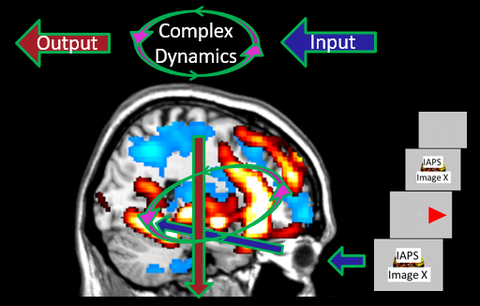Research Group Brain Dynamics and Imaging Methods
Group Leader: Michael Marxen, Ph.D.

Our brain is a complex, dynamical system.
The Brain Dynamcis and Imaging Methods Group within the Section of Systems Neuroscience is part of the Departments of Psychiatry and closely related to the Department of Psychology and the Neuroimaging Center (NIC) at the TU Dresden (TUD). The NeuroImaging Center (NIC) and the Center for Information Services and High Performance Computing (ZIH) at the TU Dresden provide an outstanding scientific infrastructure and an ideal environment for the interdisciplinary research of the group.
Our research focusses on studying brain functions related to emotions, cognitive control, and addiction. In particular, we like to understand how the state of the brain changes on the time scale of seconds to years, how the underlying brain states differ between tasks and individuals, and how such differences relate to human behaviour. In this context, we are also keen to develop better methods that improve reproducibility and specificity of brain imaging measures. Machine learning approaches are used to optimize predictions. Investing the relevance of specific input features for prediction, i.e. the interpretation of complex trained models, is an important focus. We rely primarily on magnetic resonance imaging (MRI) data for our research goals, but are also employing interventional methods such as neurofeedback or transcranial stimulation to alter brain states. Another focus of our work is the visualization of brain function and connections.
Currently, we are involved in two lines of research:
In TRR265 on “Losing and Regaining Control over Drug Intake”, we are investigating the relationsship between alcohol use disorder and the functional brain connectome using multivariate machine learning algorithms and transfer learning.
Secondly, we are developing web tools and augmented reality (AR) to improve the visualization of neuroimaging data.
Please, visit our Research page to find out more details. Useful information for scientists can be found under Resources.
